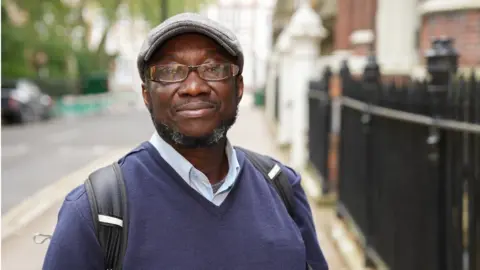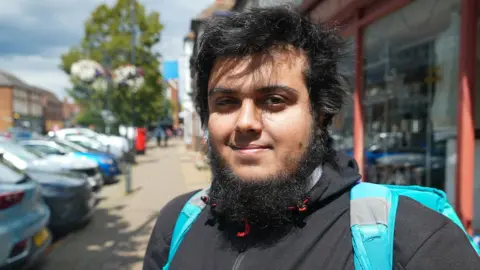Ethnic minority workers in insecure jobs up 132% since 2011
 BBC/Gemma Laister
BBC/Gemma LaisterMore than twice as many minority ethnic people are in insecure work now than were in 2011, new data suggests.
Data from the Trades Union Congress (TUC), shared exclusively with BBC News, shows minority ethnic people in this type of work increased by 132% between 2011 and 2022.
By comparison, the number of white people in insecure work increased by 9.5% over the same period.
The term "insecure work" includes those on short-term and zero-hours contracts.
TUC General Secretary Paul Nowak called the rise "structural racism in action".
"Too many Black and ethnic minority workers are trapped in low-paid, insecure jobs with limited rights and protections, and treated like disposable labour," he said.
The 132% increase refers to the increase in absolute terms of minority ethnic people in insecure work. In 2011 there were 360,241 ethnic minority people in insecure work in the UK, and in 2022 there were 836,339.
There are now almost 3.9 million people in insecure work in the UK, the data shows. Over a fifth of those - 21.5% - are from minority ethnic backgrounds.
It is now also even more likely for a minority ethnic person to be in insecure work compared to a white person than it was in 2011.
The proportion of minority ethnic people in the UK who are in insecure jobs saw a significant jump - from 12.2% in 2011, to 17.8% in 2022.
The proportion of white people in this work only increased by a small amount - from 10.5% to 10.8%.
'There's so much pressure on me'
Abraham Owusu, a 62-year-old security guard in London, is on a zero-hours contract.
These contracts allow employers to hire people with no guarantee of work.
Mr Owusu has six children and 12 grandchildren. He also financially supports his elderly parents in Ghana, including paying their medical bills.
He is about four years from retirement, but has recently been told by his employer that his hours - and as a result, his pay - are being cut. He now worries that he won't be able to continue paying for his parents' healthcare.
"They rely on me. You do everything to protect them as a son," he said. "At the finishing line, to be facing this problem… there is so much [pressure] on me."
Professor Damian Grimshaw, a sociologist from King's College London, told BBC News that minority ethnic people are increasingly likely to be in insecure work because of different types of discrimination in the labour market.
"One is structural, so you're likely to see an over-representation of certain ethnic minority groups in unemployment or inactivity or exclusion from good jobs - but they might also be in a geographical location with fewer good job opportunities," Prof Grimshaw said.
"Many organisations [also] suffer from institutional racism.
"And the third is interpersonal racism, where a person is denied a job or denied a promotion because of an interpersonal harassment or discrimination, which is against the person's race or their ethnicity."
This discrimination, Prof Grimshaw said, has meant that minority ethnic people are more likely to get stuck in a growing insecure work sector, despite having equal or better qualifications than their white counterparts.
But there are people who choose to take on jobs classed as insecure work, because of the flexibility it allows them.
 BBC/Gemma Laister
BBC/Gemma LaisterTahir Ahmed Mahmood, 19, is one of them. He told BBC News he delivers for several app-based take-away companies in Stevenage, where he lives with his parents.
He works from about 14:00 until 01:00 every day - including weekends.
"I like the flexibility," he said, adding that he takes breaks throughout the day for prayers.
"As a practising Muslim, I can go to the mosque whenever I want. Say I worked at a retail shop or something, I wouldn't have that flexibility."
But Mr Mahmood added that there are "downsides" to the job - including the uncertainty of not knowing how much work he will get on any given day. "Sometimes it might be busy, sometimes it may not be busy - so you never know."
But he added that he feels lucky this doesn't affect him as much as it does other riders, as he is young and has no children: "I'm just earning for myself at the moment, thankfully."
Clarification: We have amended an earlier version of this story showing the 132% increase is based on the absolute numbers of minority ethnic people in insecure work in 2011 and 2022.
